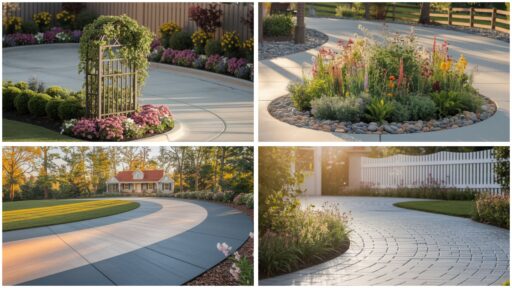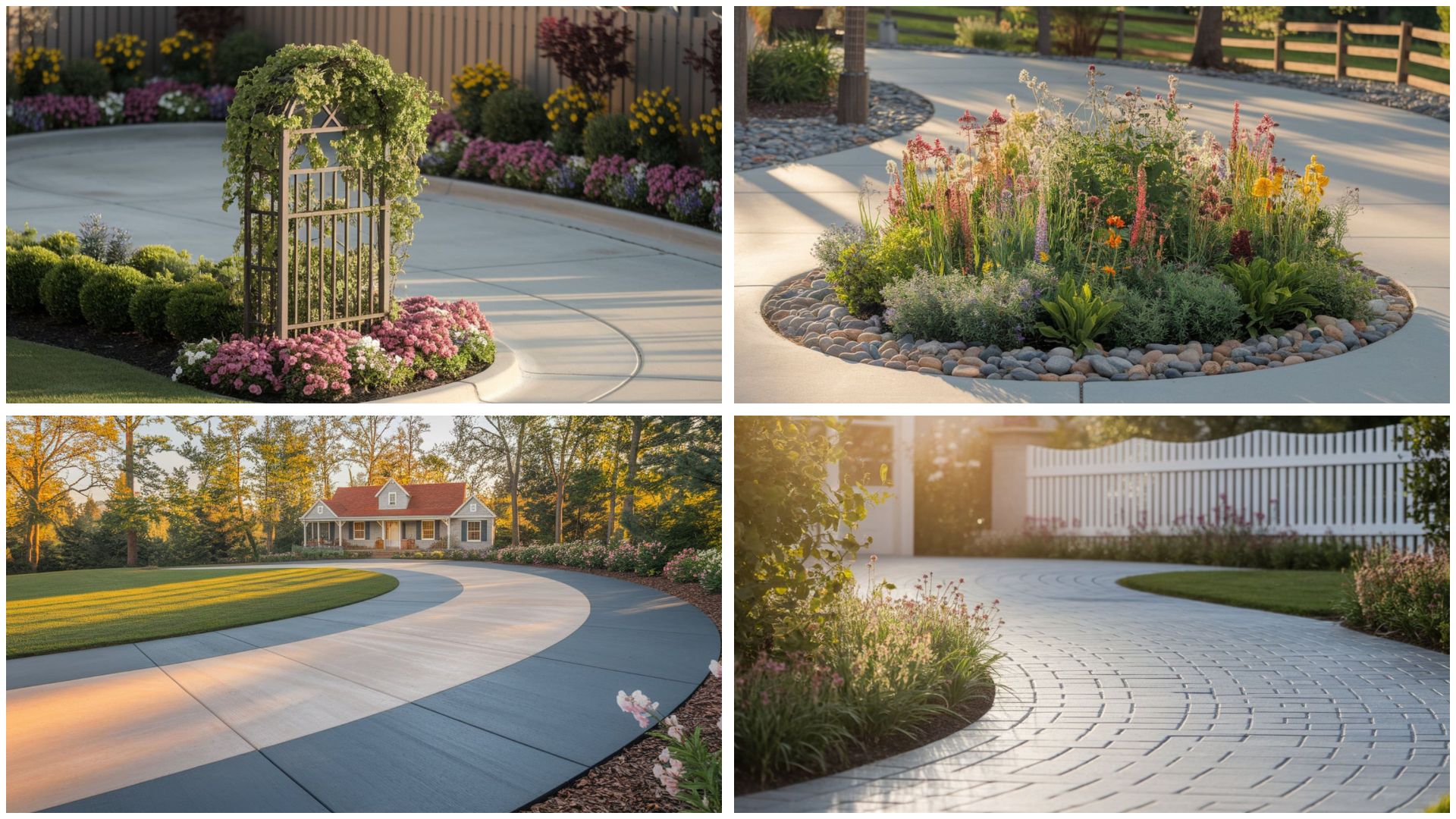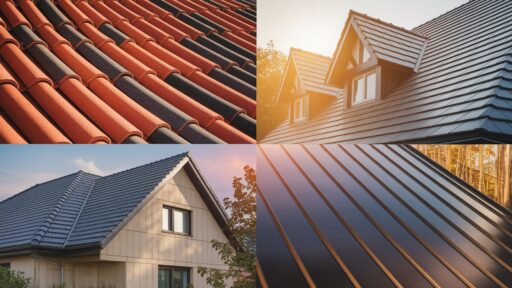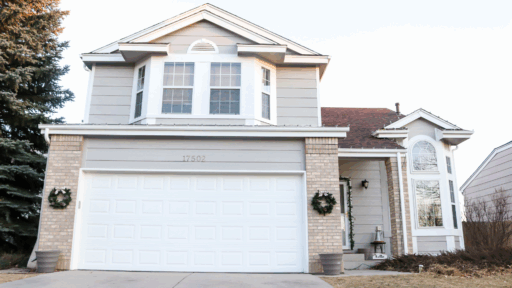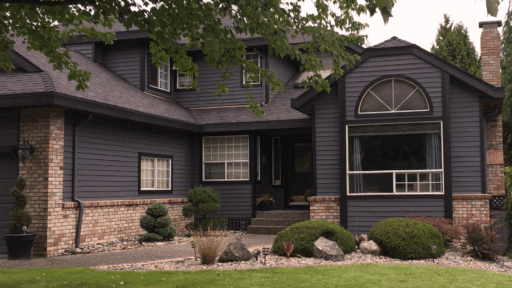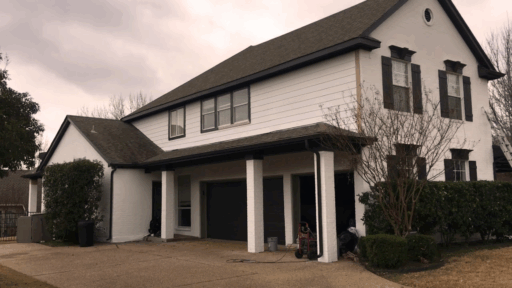Tired of backing out into busy traffic every time you leave your house?
A half-circle driveway for small yard spaces might be your perfect solution!
These curved driveways look graceful and solve common problems that straight driveways create.
You can drive forward both ways, which makes leaving safer and easier than ever before.
Even tiny yards can fit a half-circle driveway with smart planning and the right measurements.
From increasing your home’s curb appeal to adding a parking space, these driveways work magic in small spaces.
Ready to change your cramped front yard into a graceful entrance that neighbors will admire?
What Is a Half-Circle Driveway?
A half-circle driveway curves like a smile in front of your house, connecting to the street at both ends.
Unlike a full circular driveway that goes all the way around, a half circle only curves halfway.
It’s also different from a U-shaped driveway because it has a gentler, smoother curve.
Drawing half of a circle with your finger, that’s exactly how this driveway looks from above.
This design works perfectly for smaller lots where you don’t have room for a complete circle.
The curved shape gives your home a classy entrance while still fitting in tight spaces.
Most half-circle driveways are about 20-30 feet wide at the curve’s deepest point.
Benefits of a Half-Circle Driveway in a Small Yard
A half-circle driveway can solve many problems that small yards face every day.
These curved designs offer smart solutions that straight driveways can’t match.
- Easy In-and-Out Access: You never need to back out into busy traffic since you can drive forward both ways.
- Adds Curb Appeal: The curved design creates a graceful, welcoming entrance that makes even small homes look more expensive.
- Works with Narrow Lots: Smart design lets you adjust the curve to fit tight spaces without losing the beautiful shape.
- Increases Parking Efficiency: Two separate entry points mean guests can park easily without blocking anyone in or out.
These benefits make half-circle driveways a popular choice for homeowners with smaller properties.
The combination of style and function creates the perfect solution for modern living.
Space Planning: How Much Room Do You Really Need?
If you’re considering a half-circle driveway for a small yard, getting the dimensions right is key.
The table below outlines essential space planning details to help you design efficiently without wasting space.
| ASPECT | MINIMUM | IDEAL | QUICK TIP |
|---|---|---|---|
| Width per Arm | 10–12 ft (3–3.7 m) | 12–14 ft (3.7–4.3 m) | 12 ft is best for comfort; 14 ft suits SUVs or wider vehicles. |
| Turning Radius (Car) | 16–18 ft (4.9–5.5 m) | 18–20 ft (5.5–6.1 m) | Larger cars may need up to 22 ft for smooth turning. |
| Layout for Small Lots | 8–10 ft (2.4–3 m) | Compact or angled | Use curved or angled layouts to save space on narrow lots. |
| Measurement Tips | Chalk lines or stakes | Measure the car footprint | Mark layouts on the ground first; include door and turning clearances. |
This table helps ensure your driveway is both functional and attractive, making it a perfect fit for your yard.
Planning before pouring saves money and maximizes your space.
Design Ideas for Small Yards
These creative designs help you make the most of your small driveway space while adding style and charm.
From simple gravel borders to fancy LED lighting, there’s a perfect idea for every budget and taste.
Note: These costs may vary depending on your location, current market conditions, time of year, and material availability in your area.
1. Paver Stone Layout
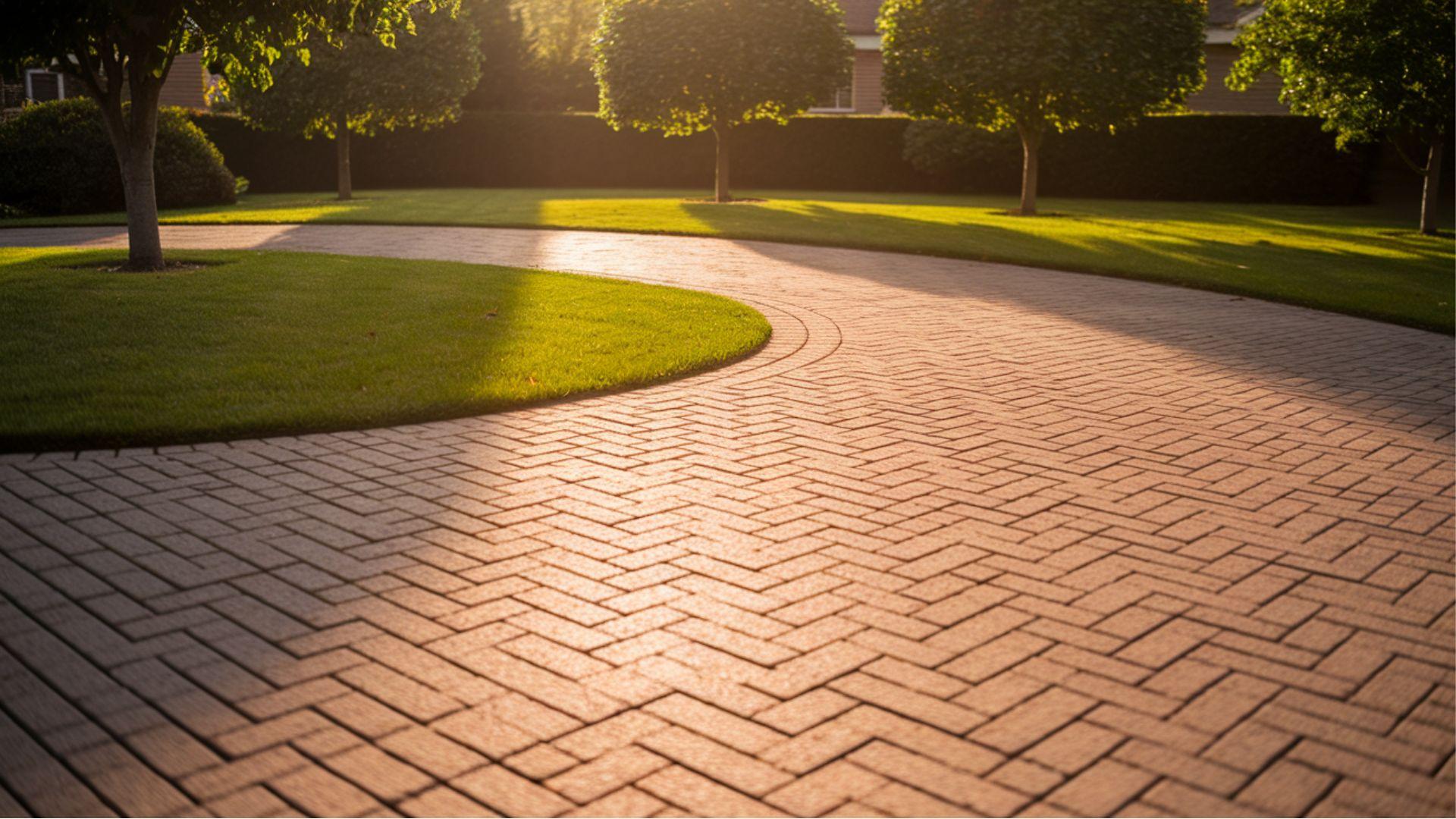
Paver stones make your driveway look clean and classy. They come in patterns that fit small yards and are easy to fix.
This layout adds style without taking up too much space and can handle lots of driving and parking.
- Safety Features: Textured surface helps tires grip better and keeps people from slipping when it rains.
- Cost: $10–$25 per square foot
2. Gravel with Brick Border
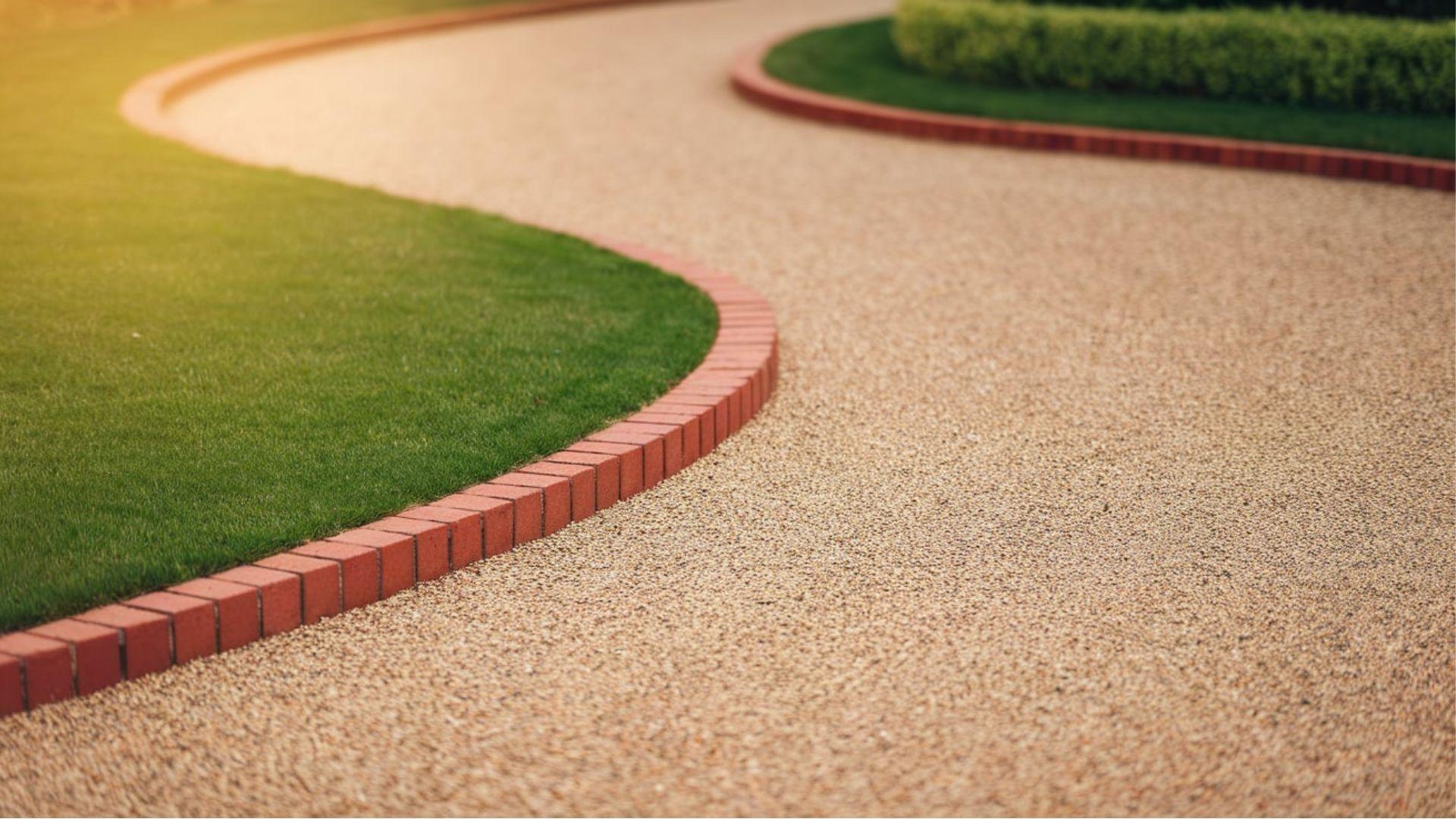
Gravel is simple and budget-friendly.
Add a brick edge to keep it in place and make the curve look nice and tidy.
It’s great for small yards and keeps the driveway looking neat with minimal effort.
- Safety Features: The brick edge prevents gravel from spreading into the yard or walkway.
- Cost: $5–$15 per square foot
3. Stamped Concrete Curve
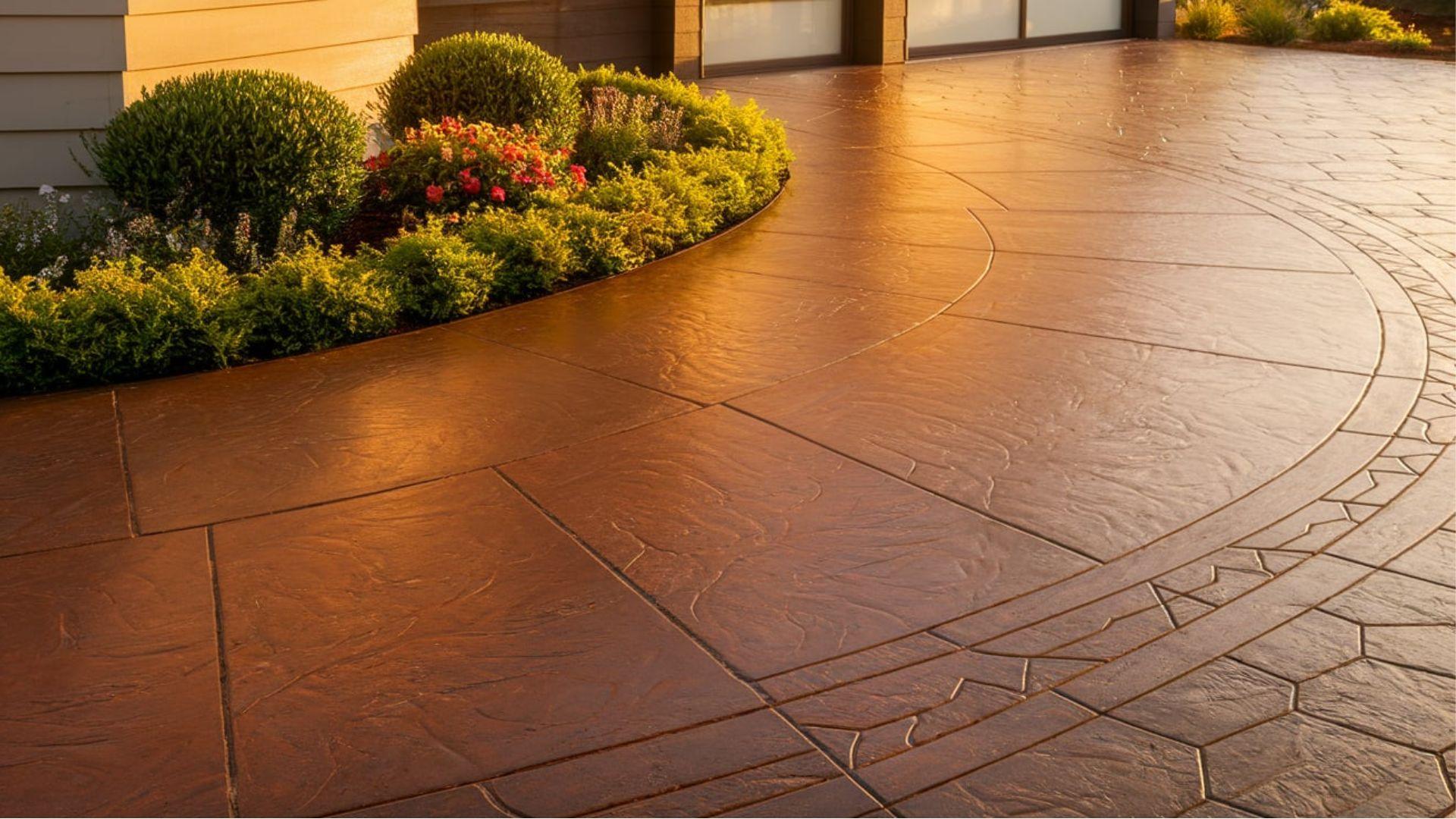
Stamped concrete resembles fancy stone but is poured concrete with designs pressed into it.
It curves nicely and looks stylish.
It’s strong, low maintenance, and a good fit for small front yards that want a touch of flair.
- Safety Features: The pattern provides grip, preventing cars and people from slipping when it’s wet.
- Cost: $12–$30 per square foot
4. Center Flower Bed
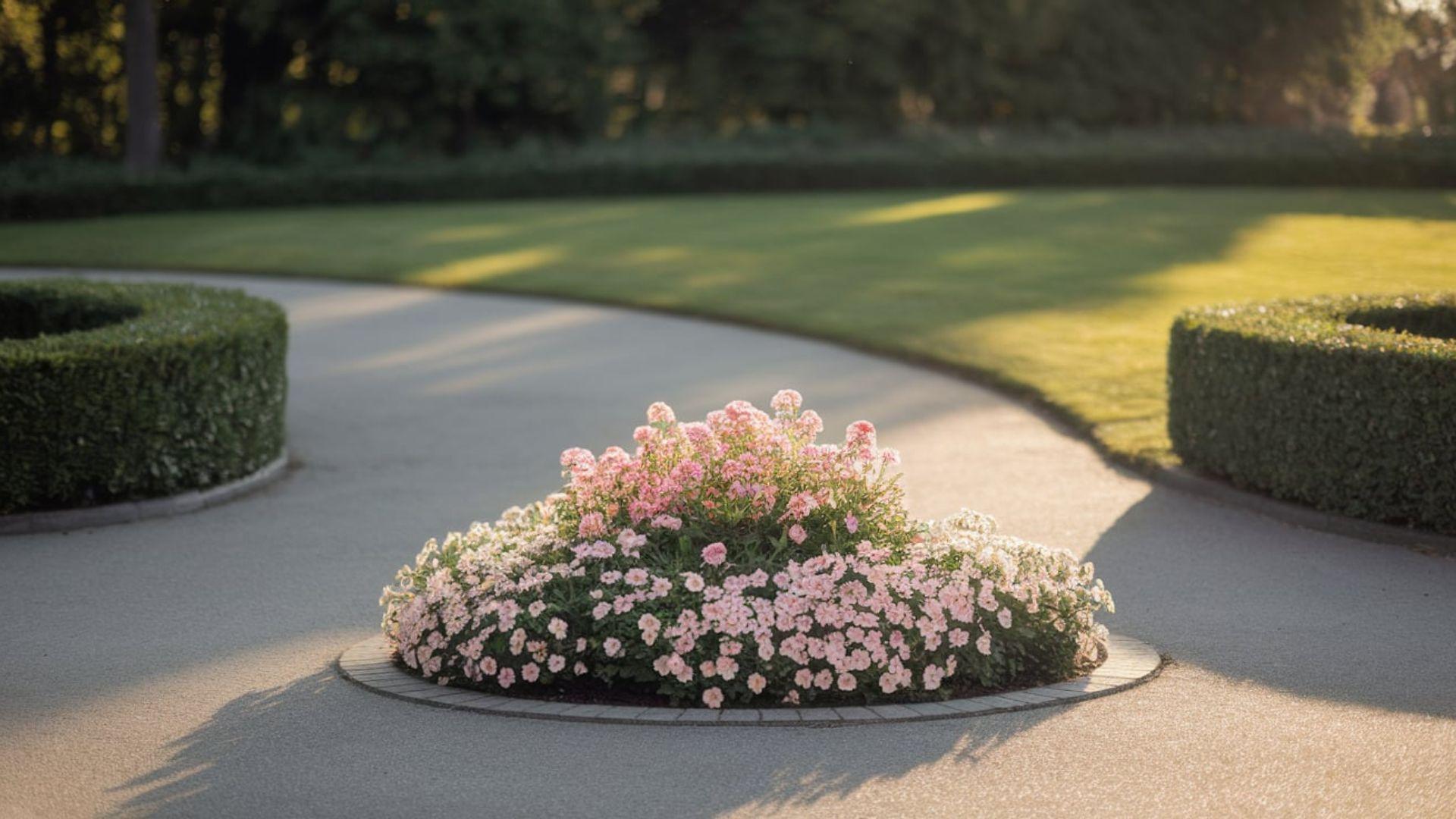
Put a flower bed in the center of the curve for color and charm. It turns empty space into a pretty garden spot.
This is perfect if you love flowers and want your yard to feel more welcoming.
- Safety Features: A raised edge around the flowers keeps cars from cutting across the middle.
- Cost: $200–$800
5. Dual-Tone Concrete
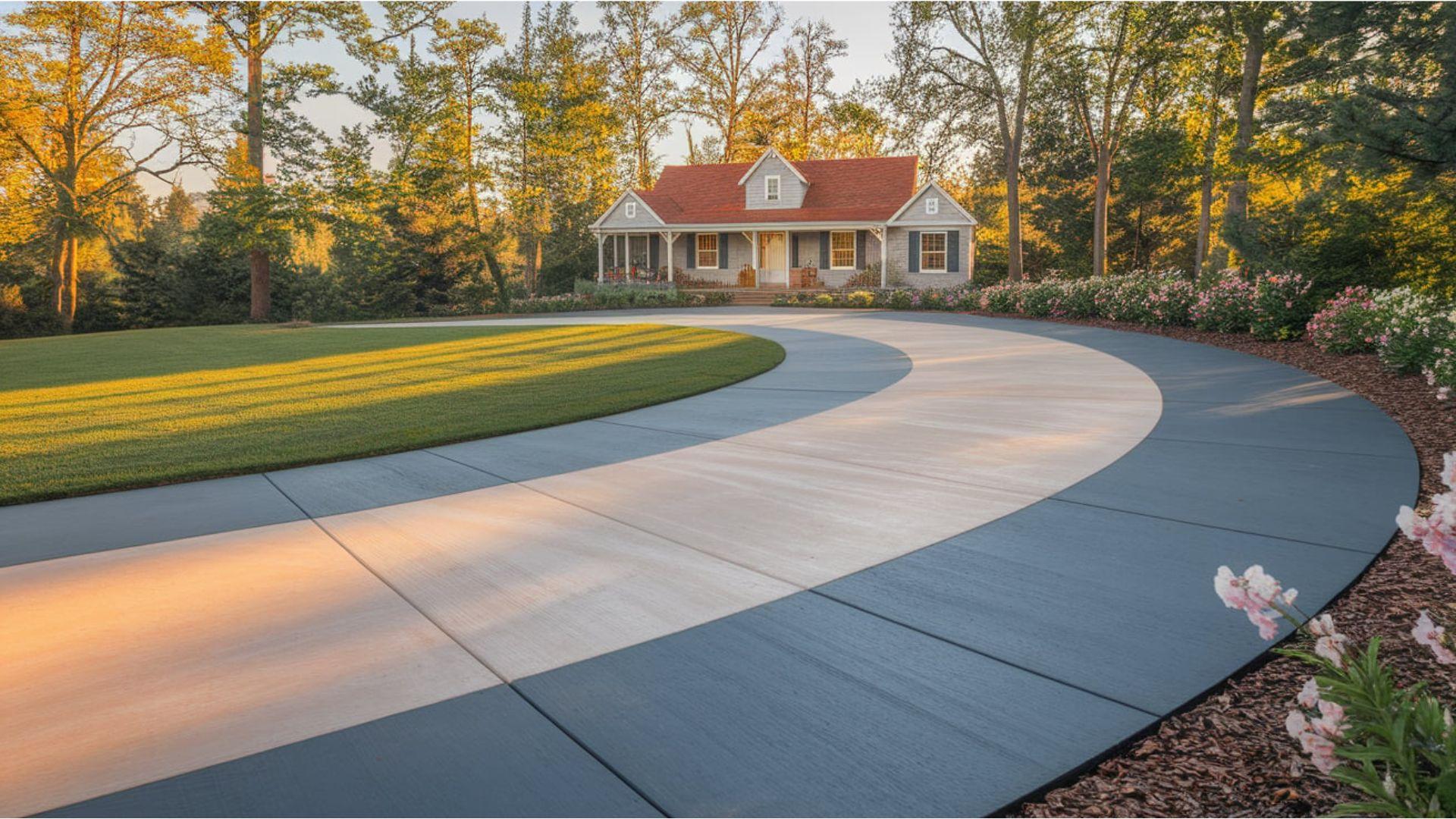
Using two concrete colors makes your driveway look special. It helps show where to enter and exit.
This design is simple but makes a big difference in style.
- Safety Features: Color contrast helps drivers see the driveway edges, especially in dark or rainy weather.
- Cost: $15–$35 per square foot
6. Low Boxwood Edging
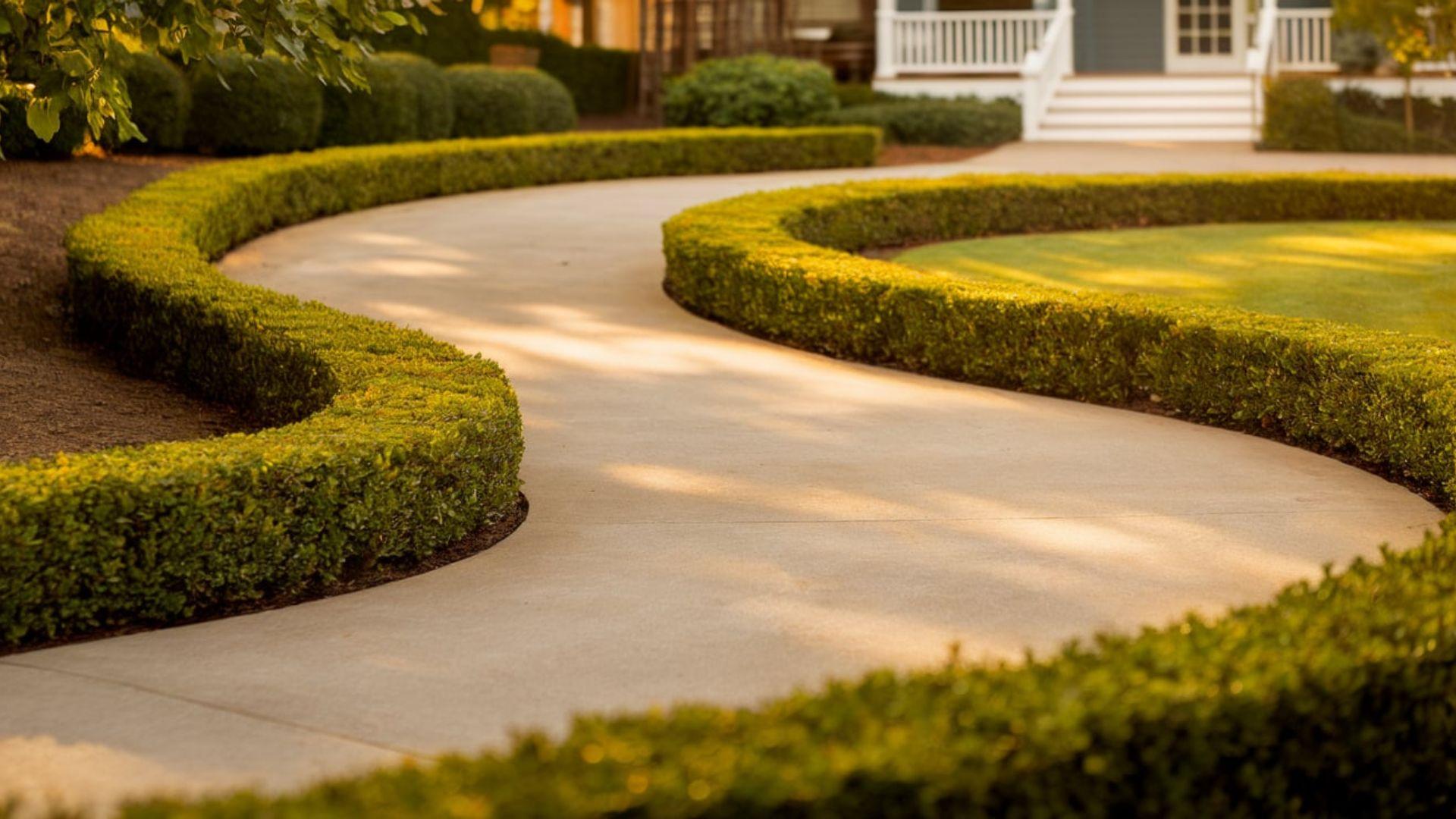
Small boxwood shrubs around the edge give the driveway a clean and green look.
They stay green all year and are easy to trim.
This adds a nice touch to your yard without taking up much space.
- Safety Features: The shrubs help show where the driveway ends so cars don’t drive over the grass.
- Cost: $5–$12 per linear foot
7. Angled Entry Point
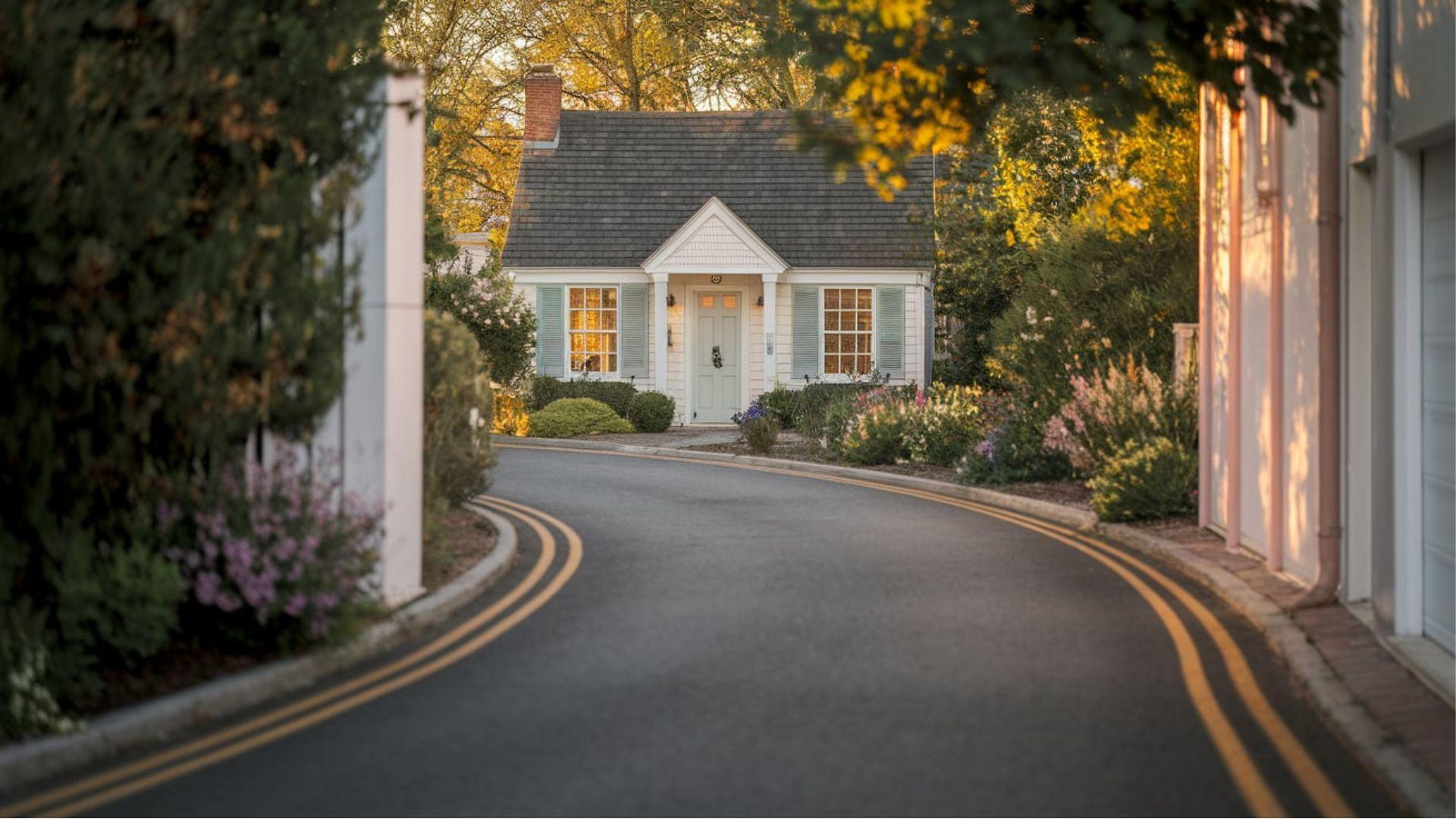
Putting the entry at an angle makes it easier to turn in, especially if your street is narrow or busy.
It fits small yards well and helps cars move smoothly.
- Safety Features: Angled entry helps drivers see better and turn more safely onto the street.
- Cost: $500–$2,000
8. Solar Path Lights
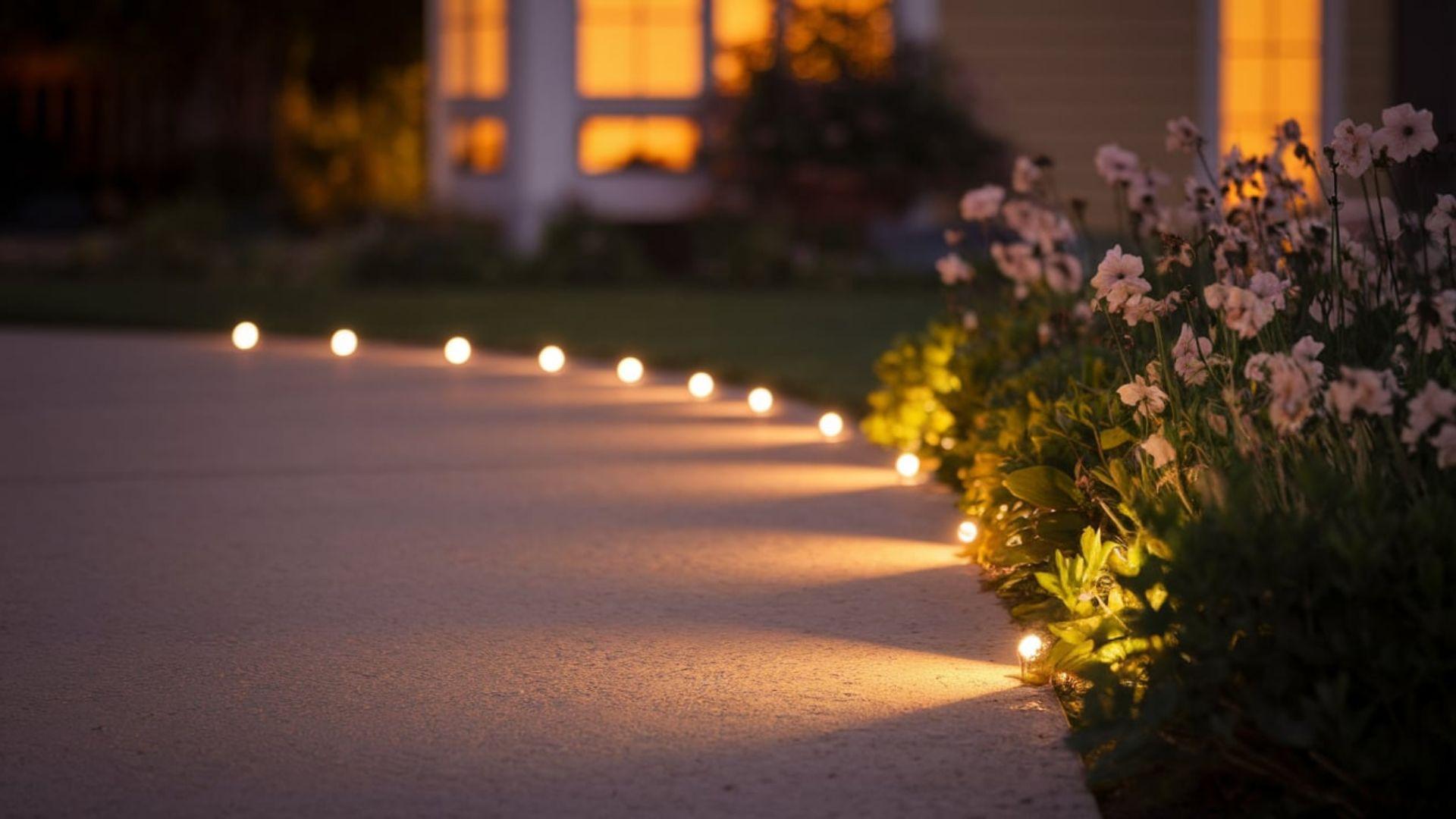
Solar lights along the driveway edge help you see at night.
They charge during the day and turn on by themselves.
No wires or plugs needed, and they add a soft glow.
- Safety Features: Lights show where the driveway is so cars and people stay on track after dark.
- Cost: $20–$50 per light installed
9. Turf Block Inset
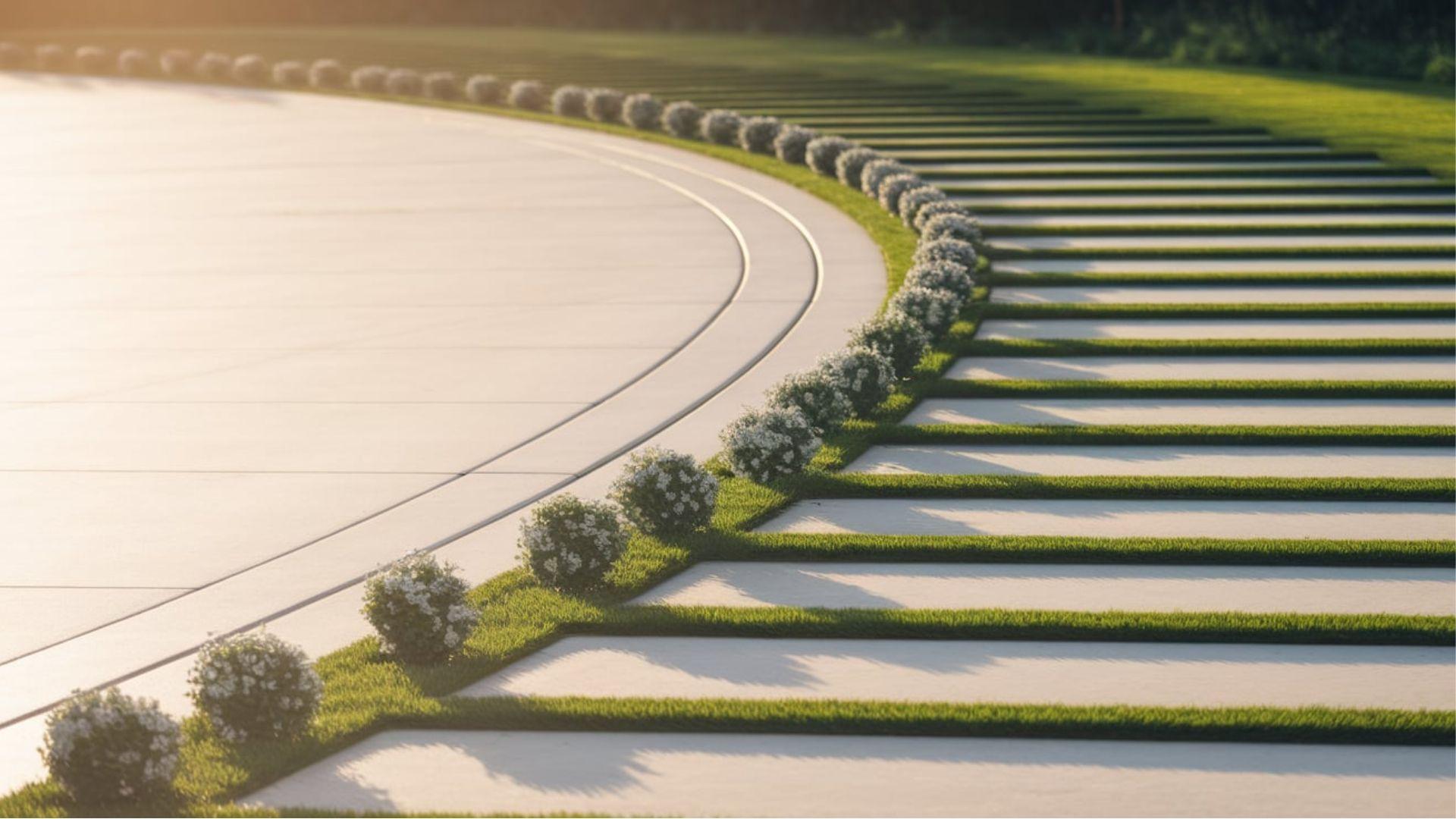
Turf blocks let grass grow between strong concrete blocks.
They look green but can still hold a car’s weight.
It’s a good way to add green without losing parking space.
- Safety Features: The open design drains water and gives a safe place to walk or park.
- Cost: $10–$20 per square foot
10. Decorative Rock Island
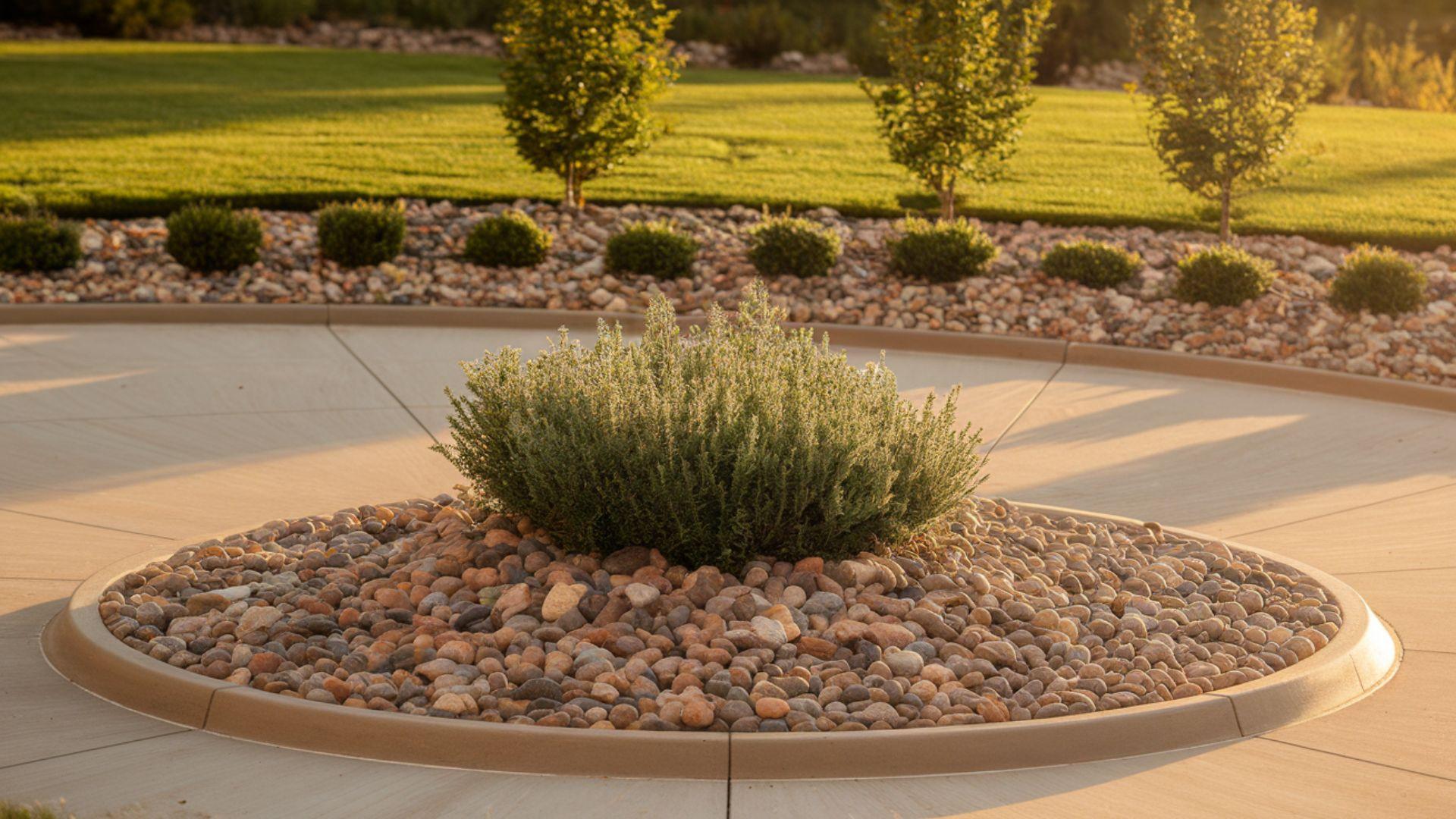
Put pretty rocks in the center of the driveway curve.
It’s easy to take care of and makes the space look nice.
You won’t have to mow or water it, and it adds color and texture.
- Safety Features: Rocks in the middle help guide cars and stop them from cutting corners.
- Cost: $300–$1,000
11. Metal Driveway Gate
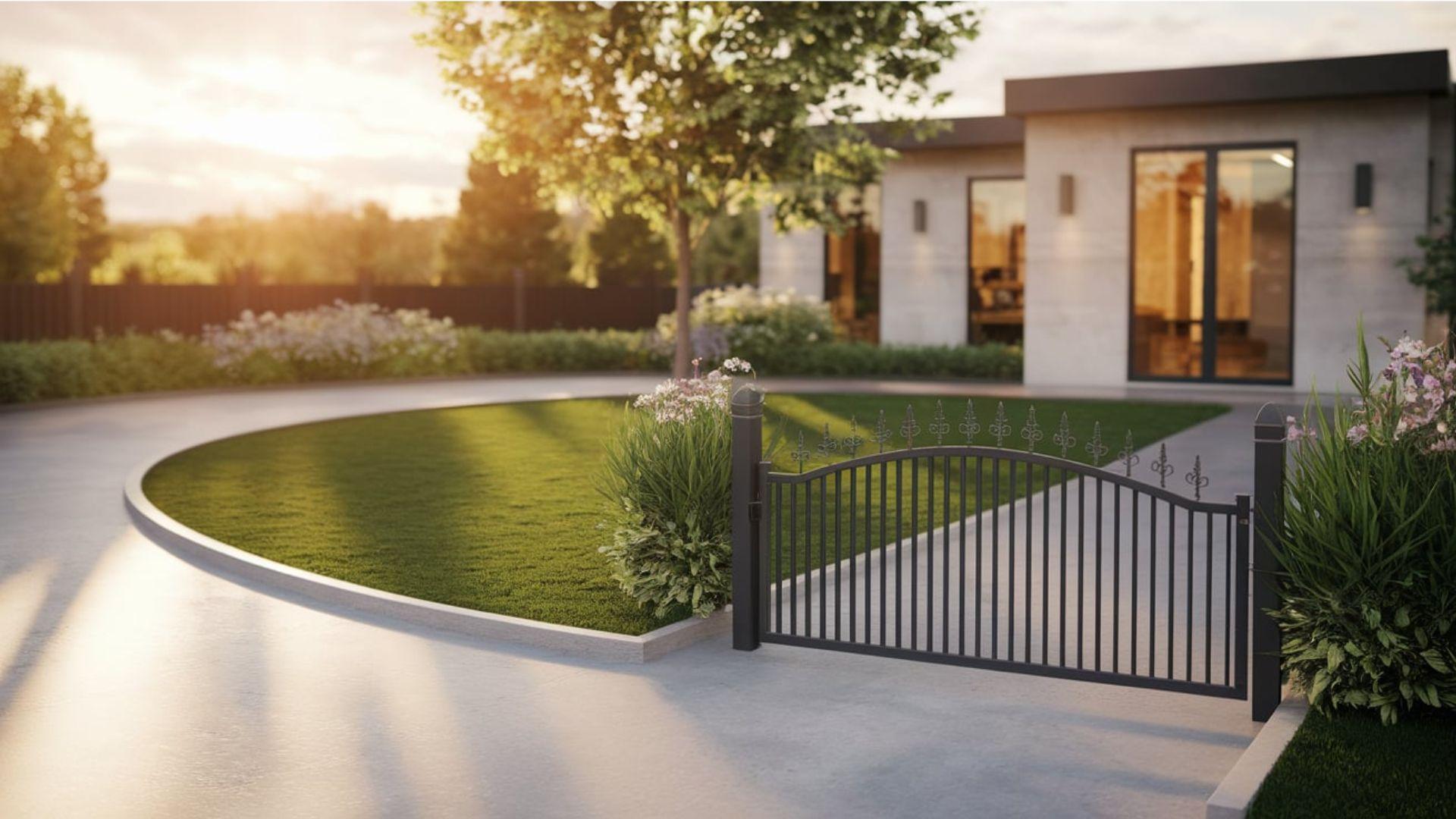
A short metal gate across your driveway adds safety and style.
It works great for small yards and cozy entryways.
You can keep pets in and strangers out while still making your driveway look neat.
- Safety Features: Blocks access when closed and adds a clear boundary for cars and people.
- Cost: $1,500–$5,000
12. Permeable Paver Surface
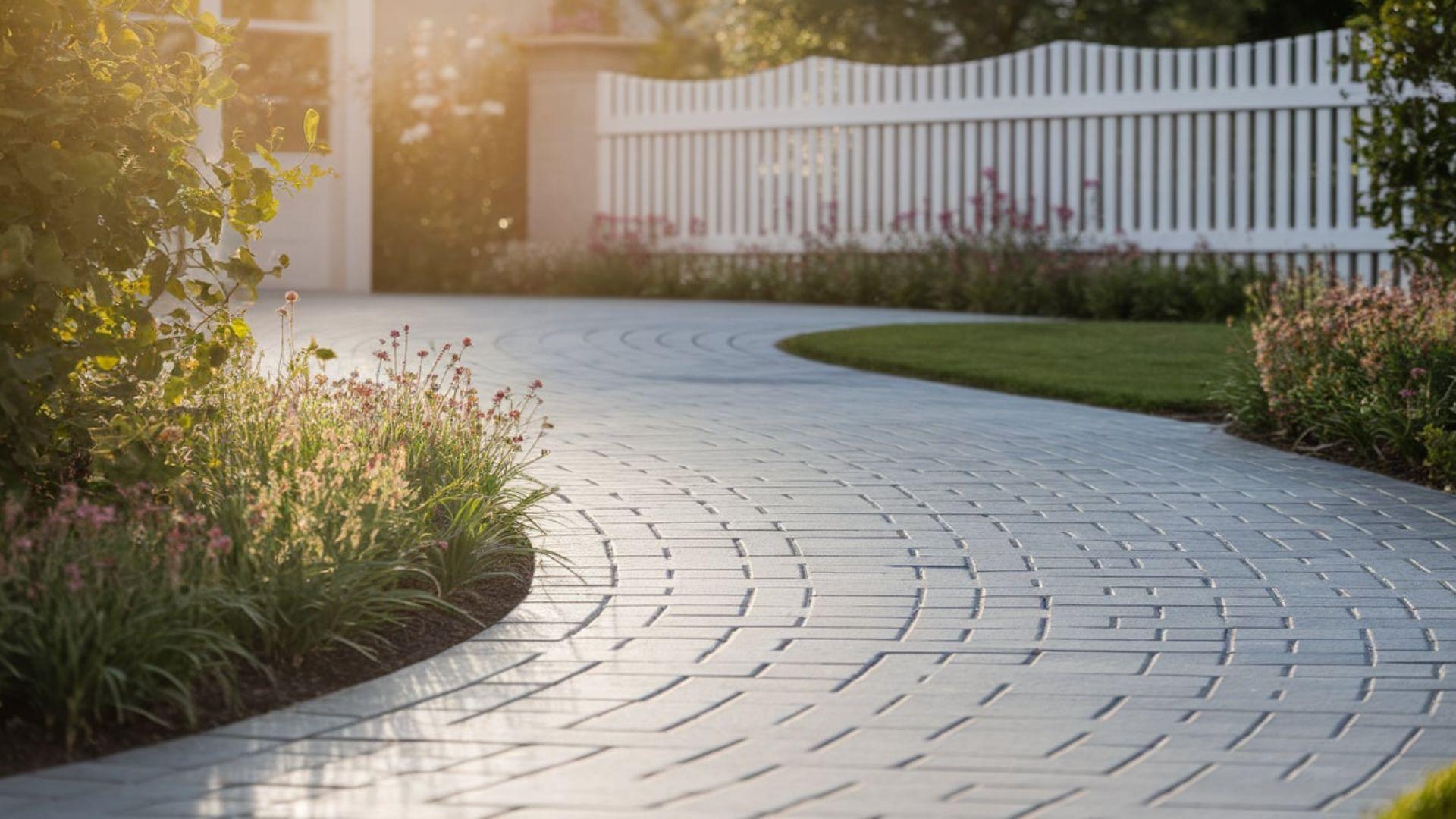
Permeable pavers let water soak through, so your yard doesn’t flood.
They look like regular pavers, but they help the earth too.
It’s a smart pick for small driveways with little room for drains.
- Safety Features: Stops puddles from forming and helps keep the surface dry after rain.
- Cost: $15–$30 per square foot
13. Wheel Track Strips
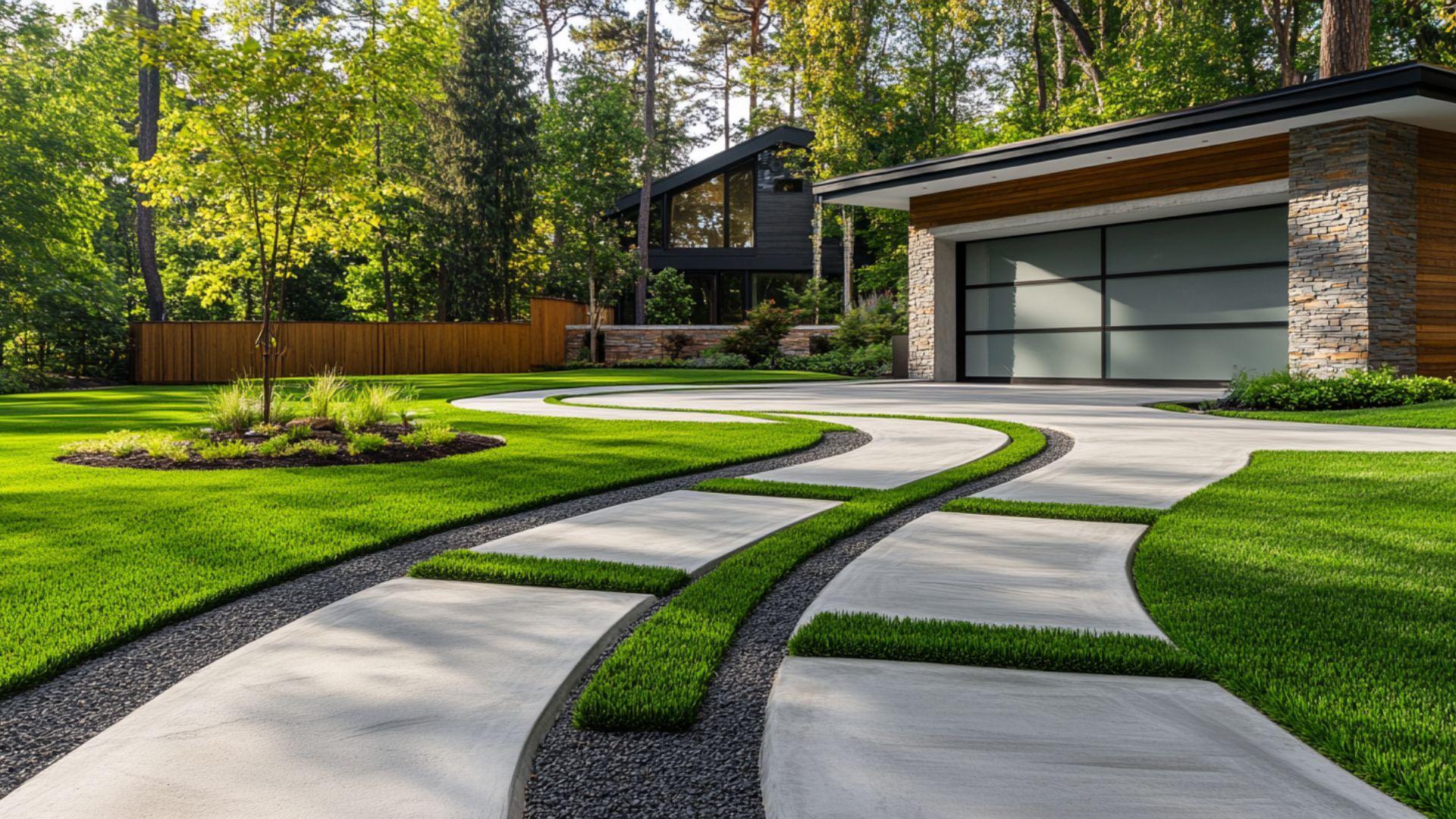
Use two narrow concrete strips where tires go, and leave grass or gravel in between.
It’s great for saving space and money.
It gives a clean, simple look and is easy to build.
- Safety Features: Keeps the car on track while letting grass or gravel help with drainage.
- Cost: $8–$20 per linear foot
14. Circular Brick Detail
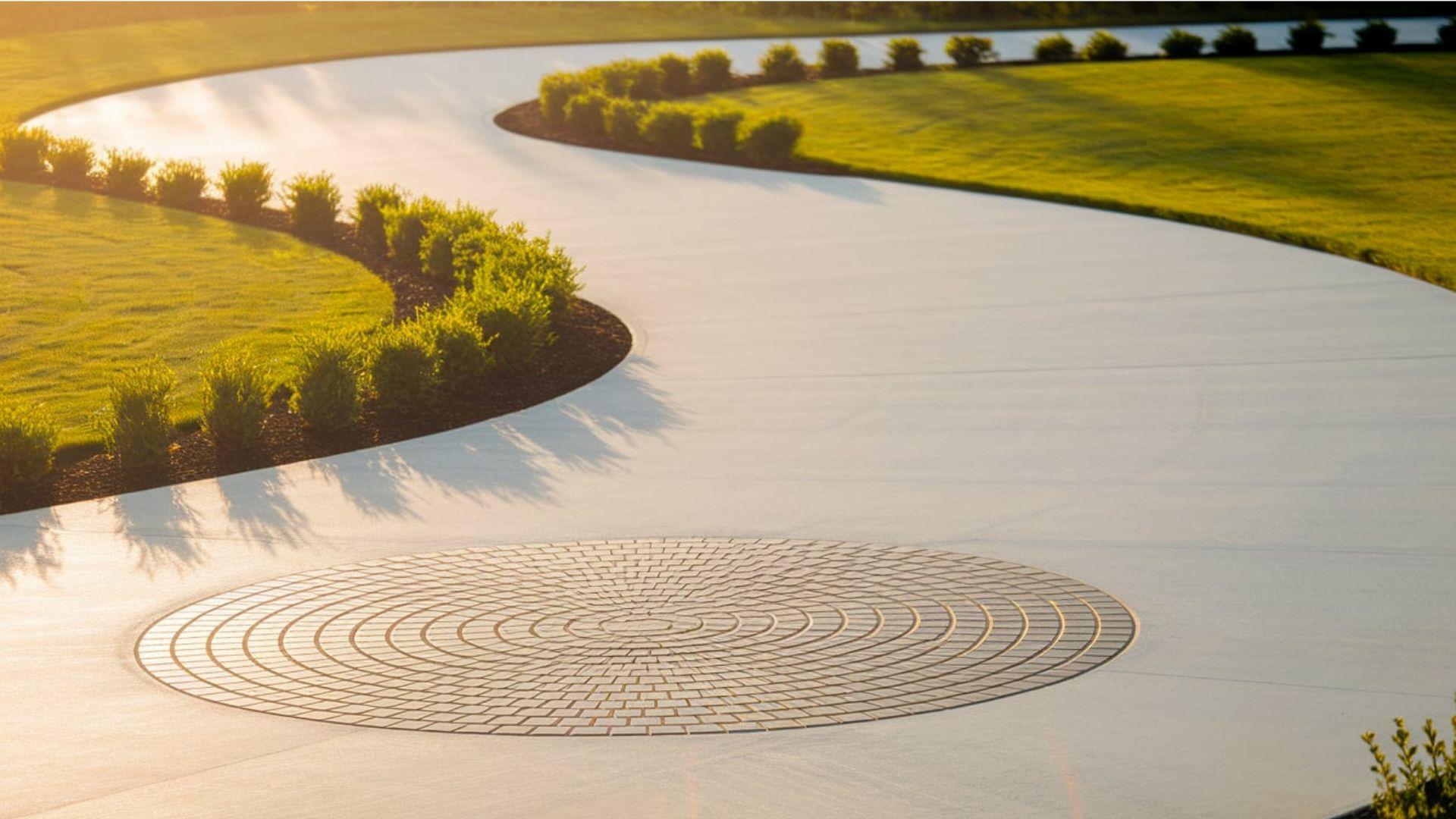
Add a round brick pattern in the center or entry curve for a fancy touch.
It breaks up plain concrete nicely.
This small detail makes a big difference in curb appeal.
- Safety Features: Helps mark the center visually so cars follow the right path.
- Cost: $20–$40 per square foot
15. LED Curve Lighting
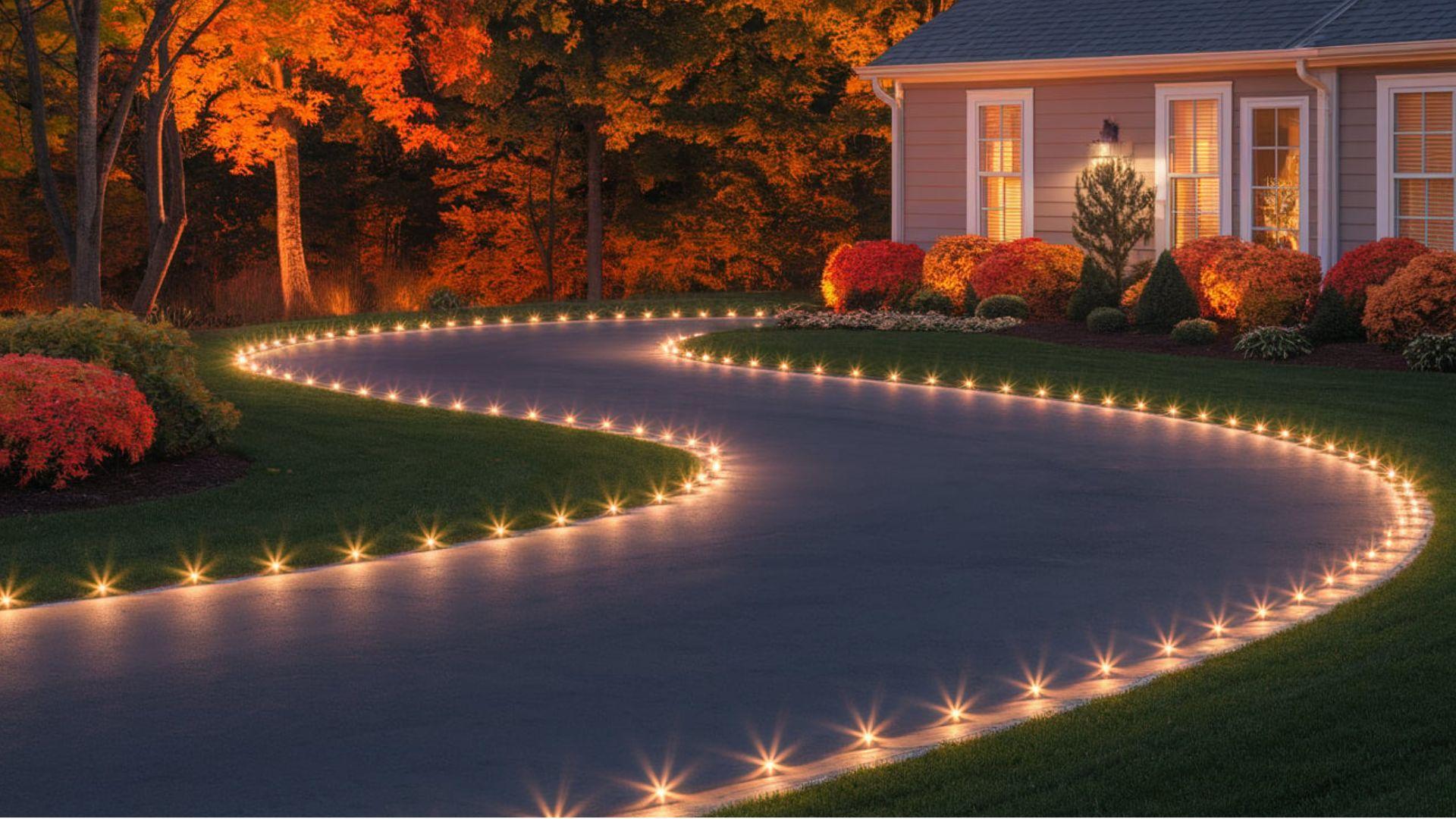
Add tiny LED lights along the curve of your driveway.
They shine at night and guide your way without being too bright.
They’re energy-saving and look modern.
- Safety Features: Lights show the curve clearly so cars stay on track in the dark.
- Cost: $30–$70 per linear foot
16. Matching Mailbox Planter
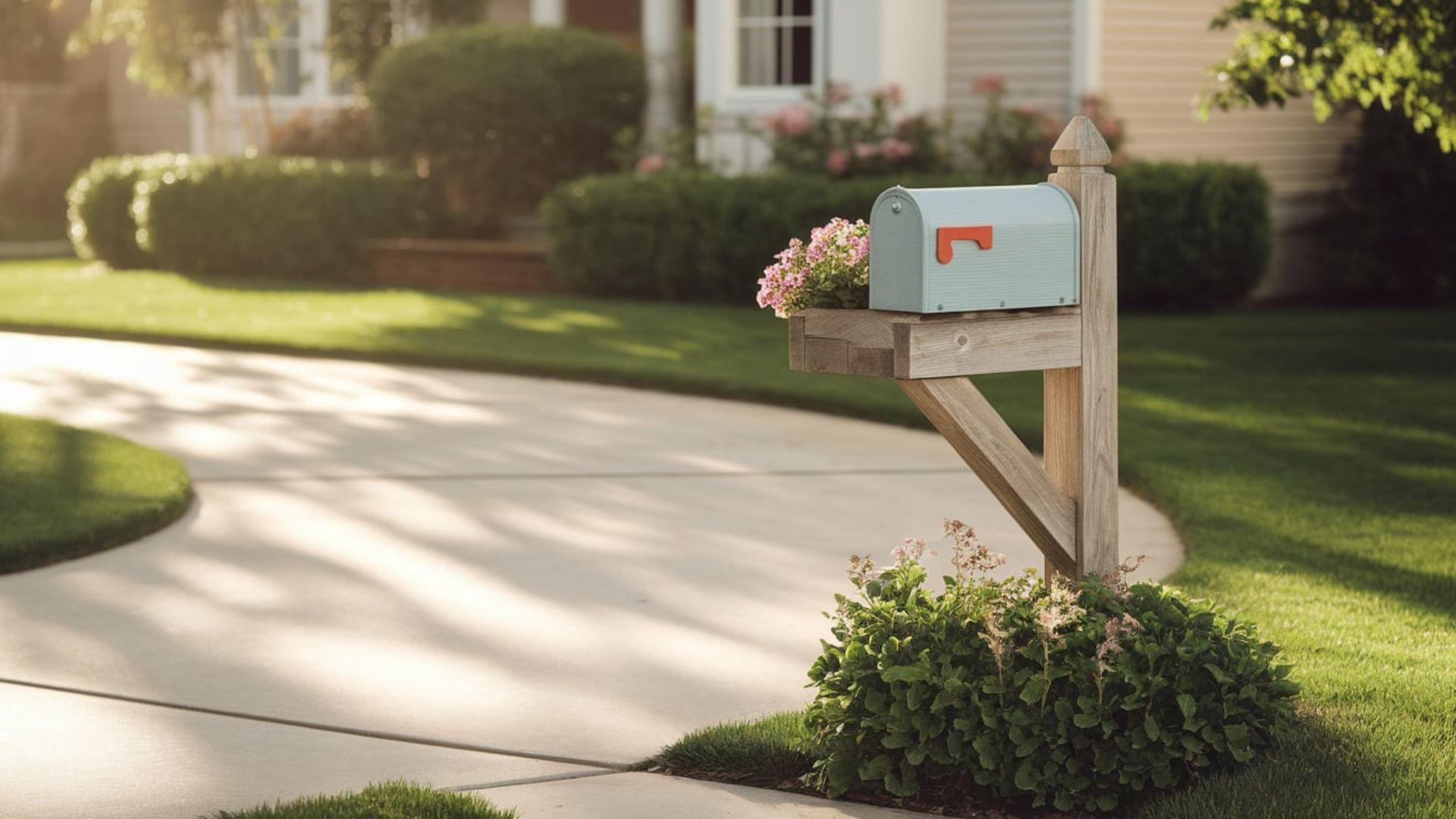
Place a small planter next to your mailbox that matches your driveway design.
It adds charm and ties everything together.
This works well even in tight yards.
- Safety Features: Keeps the mail area visible and gives drivers a clear marker near the road.
- Cost: $200–$600
17. Center Rain Garden
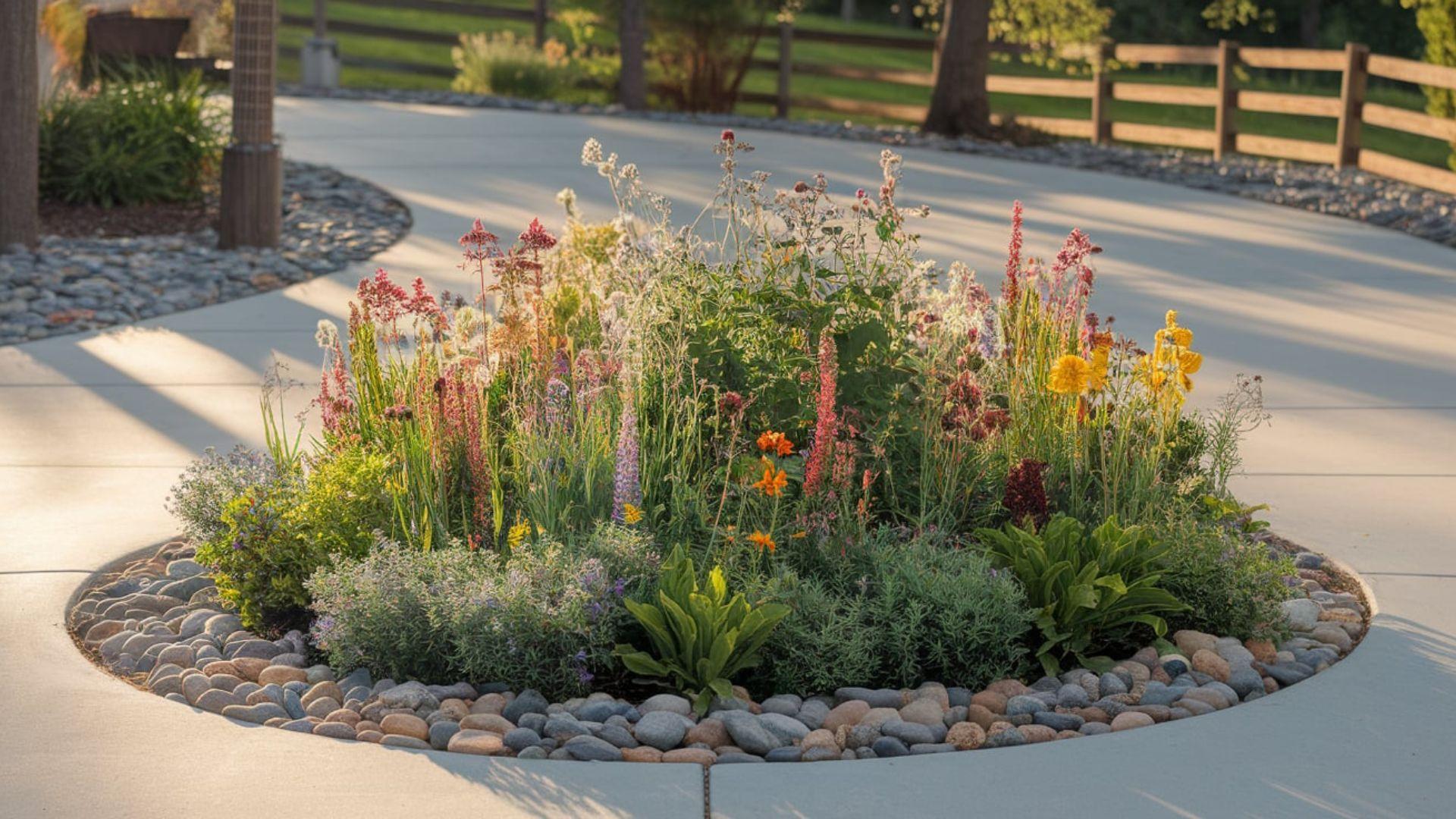
Put a shallow garden in the center of the driveway that collects rainwater and grows pretty plants.
It helps the Earth too.
It’s both useful and beautiful.
- Safety Features: Slows down rainwater and keeps the driveway from getting too wet or slippery.
- Cost: $1,000–$3,000
18. Curved Wooden Fence
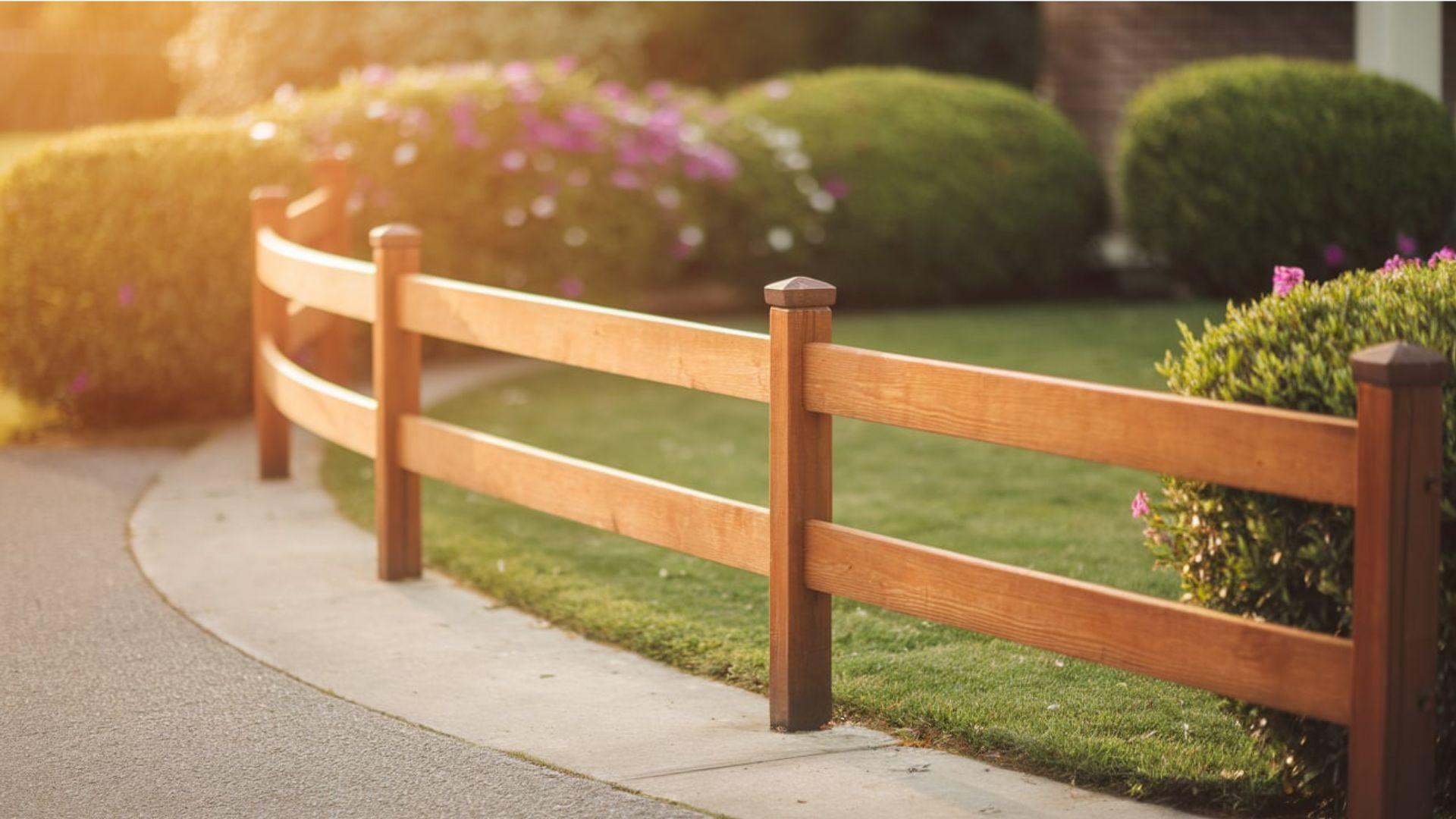
A short wooden fence that follows the curve adds privacy and frames the space nicely.
It blends well with small yards.
Paint it or leave it natural—it works either way.
- Safety Features: Defines the edge clearly and helps keep pets and kids inside safely.
- Cost: $25–$50 per linear foot
19. Address Number Pedestal
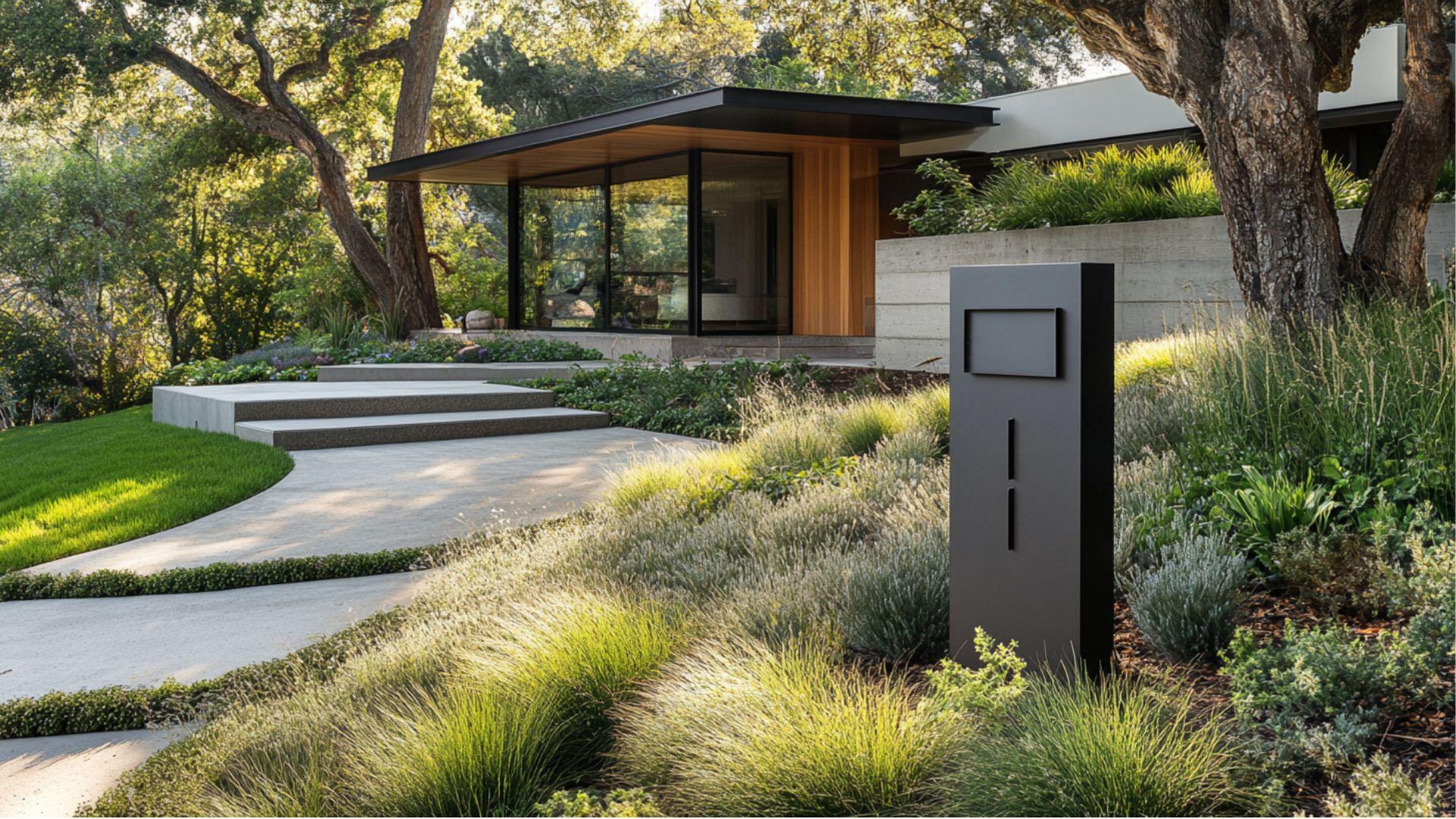
Place your house numbers on a small stone or metal stand near the driveway curve.
It’s helpful and looks neat.
It makes finding your house easier for guests and delivery drivers.
- Safety Features: Easy-to-see numbers help people find your home quickly, even at night.
- Cost: $150–$400
20. Mini Retaining Wall
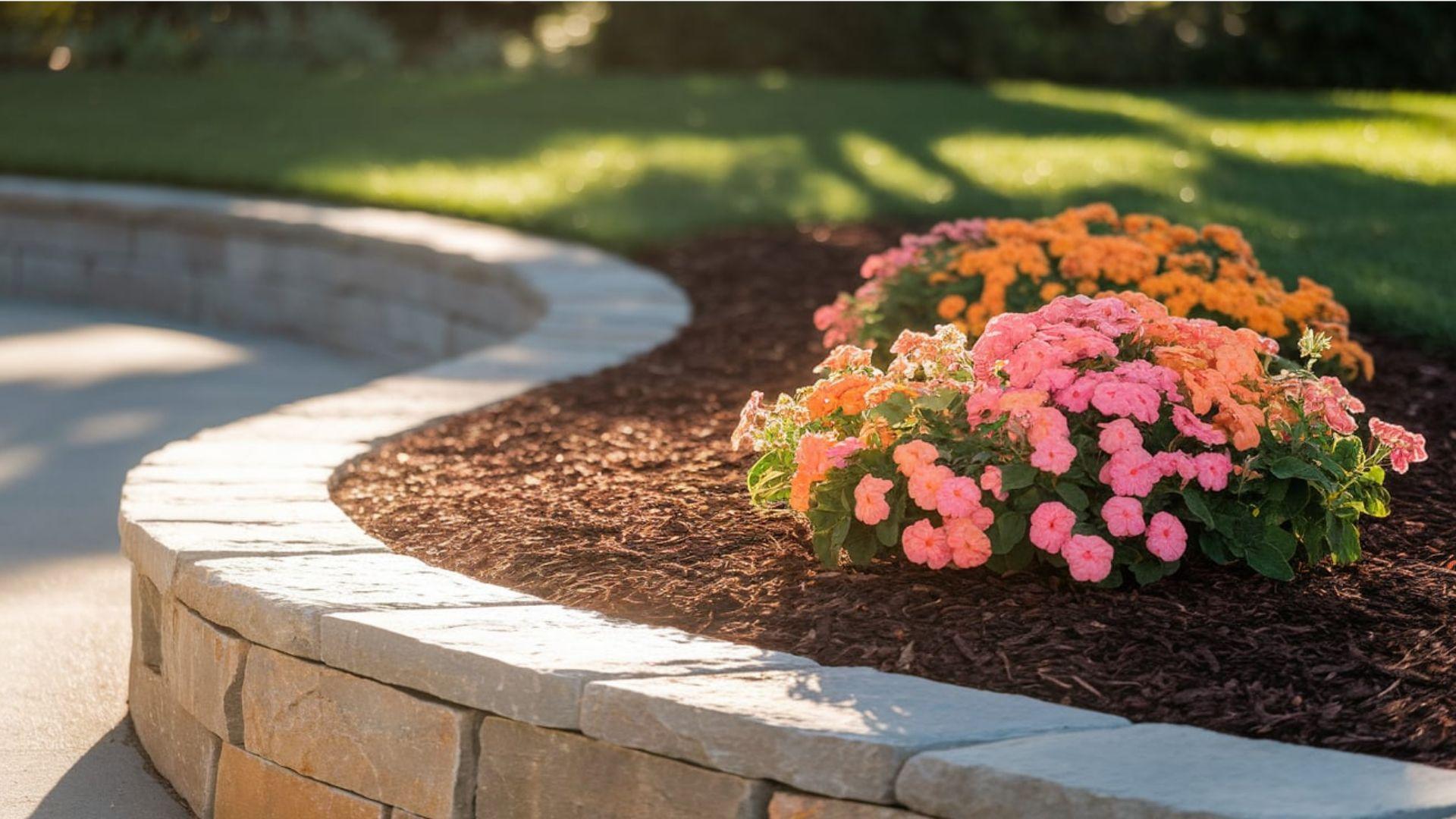
A small curved wall around a slope or flower bed helps shape the driveway area.
It keeps things tidy and stops erosion.
It’s great for homes on a slight hill.
- Safety Features: Holds soil in place and keeps the edge from crumbling after heavy rain.
- Cost: $20–$50 per square foot
21. Concrete with Mosaic Band
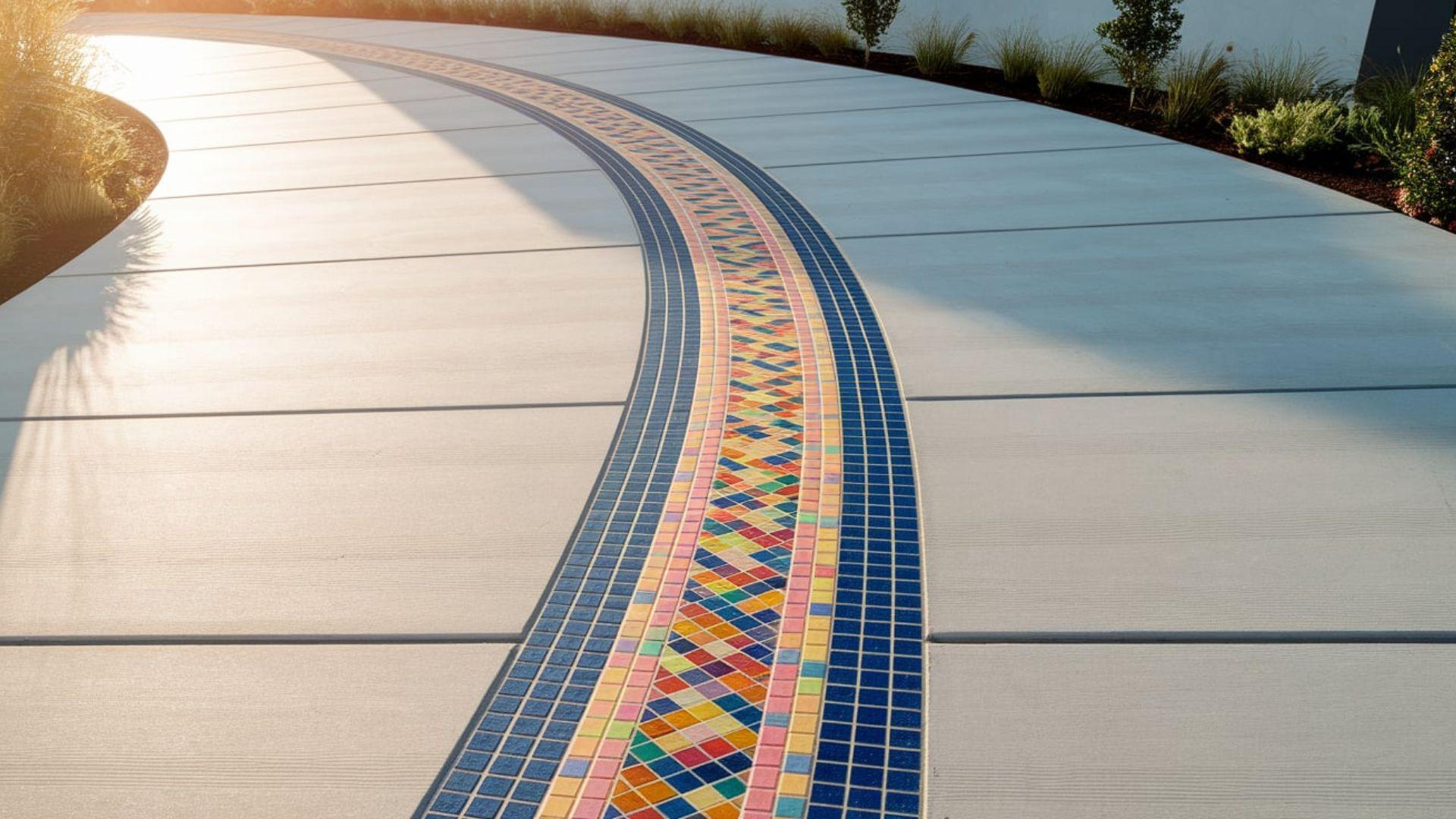
Add a colorful mosaic strip across the curve or entry using tiles or stone.
It adds art to your plain driveway.
Even small details, like this, can make your yard stand out.
- Safety Features: The Mosaic strip acts as a visible border and helps drivers stay centered.
- Cost: $25–$50 per square foot
22. Vertical Plant Trellis
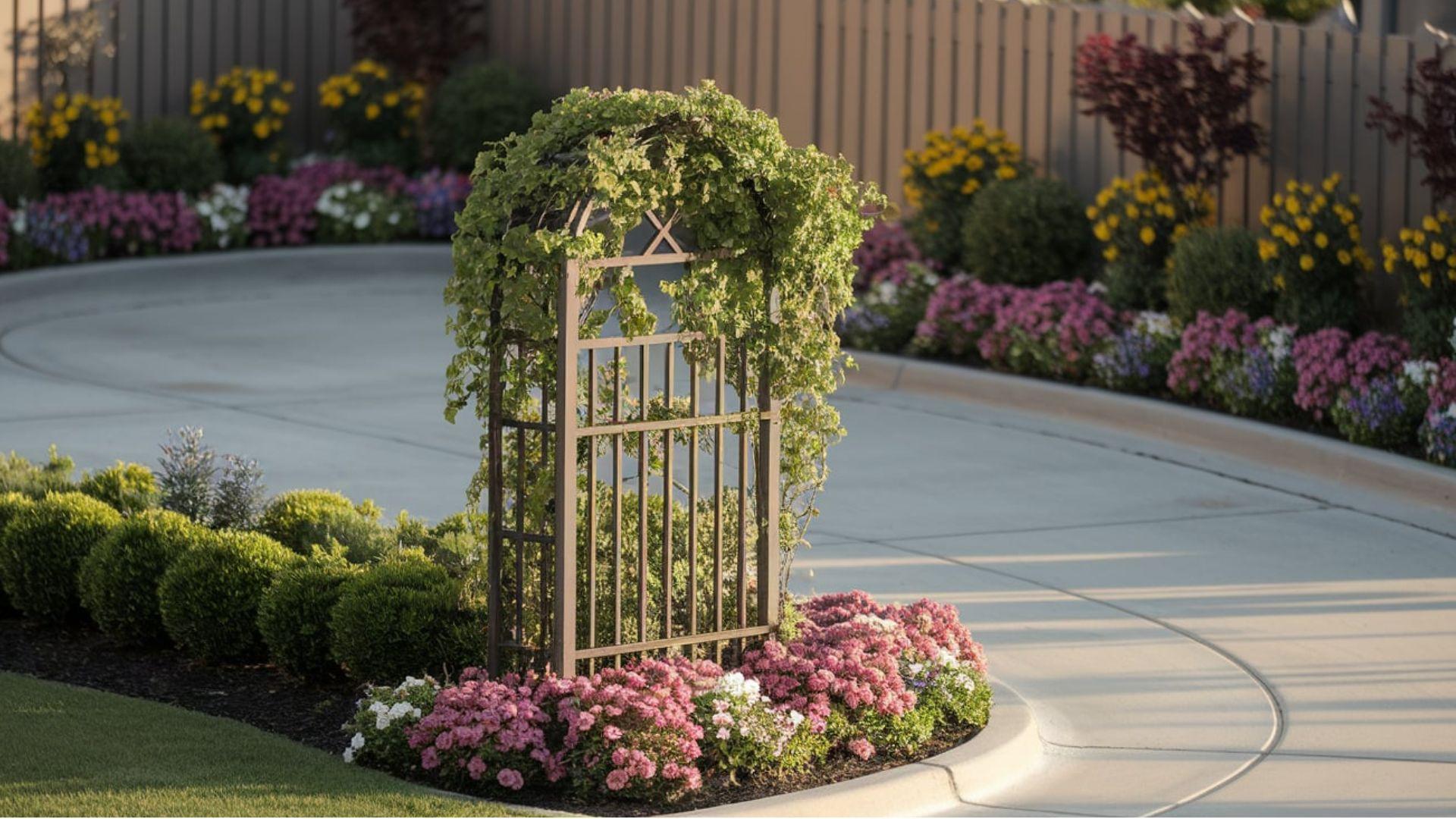
Install a plant trellis along one side with vines or flowers.
It adds privacy without taking up yard space.
Great for adding green to tight spots.
- Safety Features: Softens the driveway’s edge and makes a gentle barrier for kids or pets.
- Cost: $100–$400
23. Entry Pergola Arch
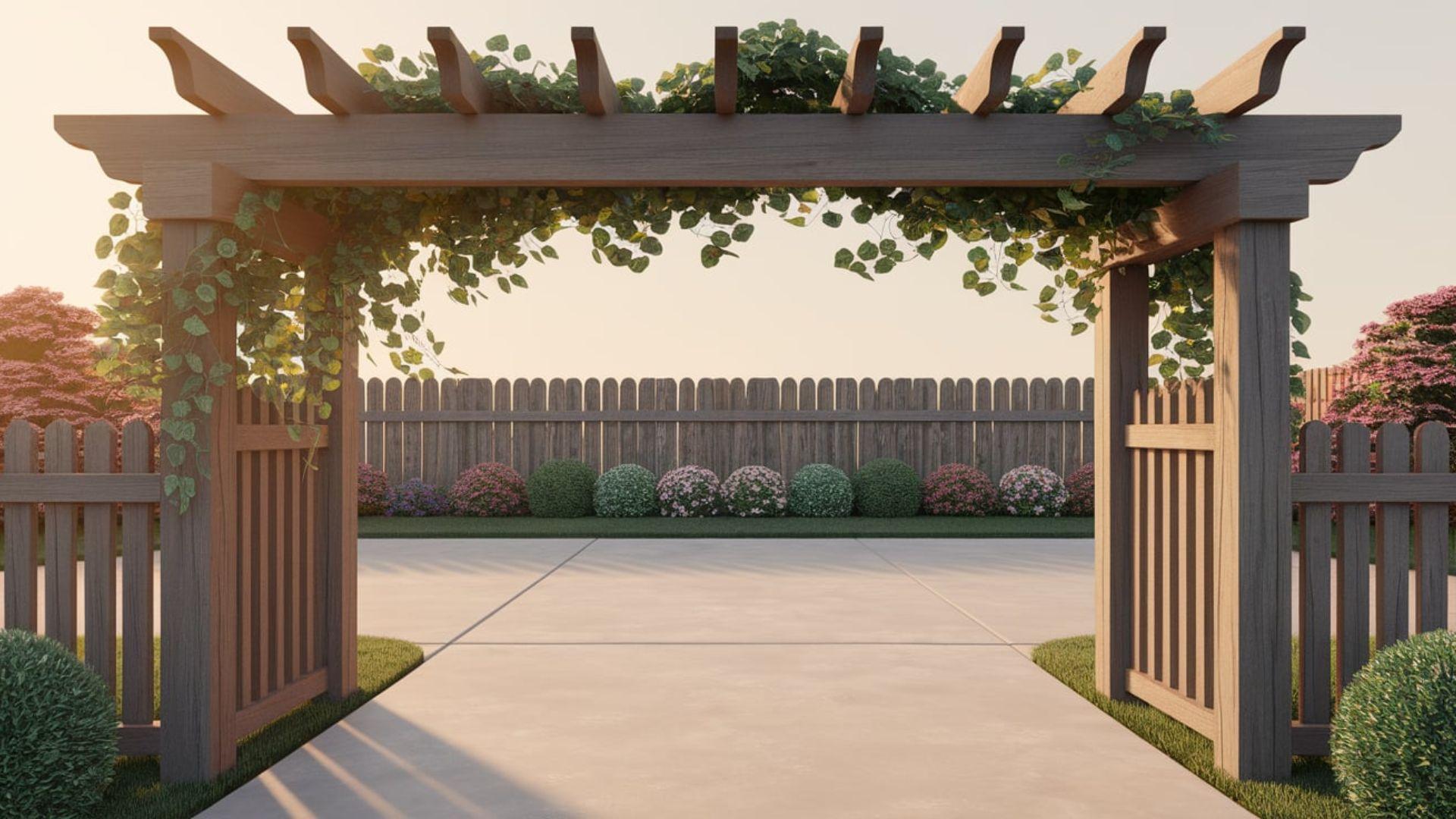
A small wood pergola over the driveway entry makes it feel cozy and special.
Add vines or lights for an extra touch of charm.
It’s a big look for a small space.
- Safety Features: Frames the entrance clearly and can accommodate lights for improved nighttime visibility.
- Cost: $1,000–$3,000
Installation Tips and Considerations
Installing a half-circle driveway requires careful planning and attention to local rules and regulations.
Smart preparation now saves you time, money, and headaches during the construction process.
- Check Local Permits First: Most cities require permits for new driveways, especially ones that change drainage patterns or street access.
- Plan for Proper Drainage: Water needs a path to flow, so your driveway must slope away from your house toward designated drainage areas.
- Mark Underground Utilities: Call 811 before digging to locate gas, electric, and water lines under your planned driveway area.
- Work Around Existing Trees: Large trees and their extensive root systems can cause driveways to crack, so plan your curve to avoid major landscaping issues.
- Consider Your Soil Type: Clay soil holds water and shifts more than sandy soil, affecting what foundation materials work best.
Getting these details right from the start ensures your project runs smoothly and lasts longer.
Professional contractors can help guide you through local requirements and ensure your new driveway meets all relevant standards.
Common Mistakes to Avoid
Planning your half-circle driveway carefully helps you avoid costly mistakes that many homeowners make.
Learning from others’ errors can save you both time and money on your project.
- Not measuring the turning radius correctly means many people make curves too tight, forcing cars to back up or drive over grass areas.
- Overcrowding with plants happens when you plant too close to the driveway edge, blocking car doors and creating maintenance headaches later.
- Forgetting about water runoff can lead to poor drainage planning, resulting in puddles, ice patches, and water flowing toward your house’s foundation.
- Ignoring property lines can create legal issues when building too close to a neighbor’s property and significantly limit future landscaping options.
- Choosing the wrong materials for high-traffic areas leads to cracks, potholes, and expensive repairs within just a few years of installation.
Taking time to plan properly prevents these common problems from ruining your driveway project.
A little extra effort up front saves you from major headaches and repair costs down the road.
Final Thoughts
A half-circle driveway for small yard spaces alters both function and beauty in your home’s entrance.
From easy traffic flow to stunning curb appeal, these curved designs solve problems while adding value.
If you choose pavers, concrete, or gravel, the right materials make your small space look bigger.
Smart planning prevents costly mistakes and ensures your driveway lasts for many years to come.
Remember to check permits, plan drainage, and measure carefully before starting your project for the best results.
Your small yard deserves a driveway that works as hard as it looks good every day.
Comment below which design idea caught your eye!
If you’re interested in more Home Exterior content, check out our other blogs that you might enjoy.

